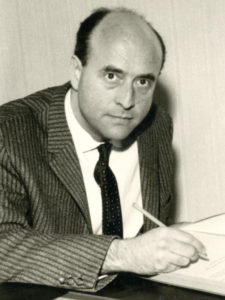“Anecdotes in Blumenberg Are Like the Pause Button on the Tape Recorder of Everyday Life”
In this Episode
Die Legitimität der Neuzeit, Die Genesis der kopernikanischen Welt, Arbeit am Mythos—by looking at the titles of Hans Blumenberg’s main works, one could get the impression that he was a philosopher of the grand narrative. Towards his later years, however, Blumenberg turned to the small form, in particular, to fables, glosses, and not least anecdotes.
Where does Blumenberg’s predilection, his Vorliebe for short forms come from? How does the anecdote relate to history, and telling stories to philosophy? And what do imaginary anecdotes reveal about reality? A conversation with Cornell Professor Paul Fleming about the epistemological, rhetorical, and revolutionary potential of anecdotes.
Paul Fleming is Professor of Comparative Literature and German Studies at Cornell University.
His translation of Hans Blumenberg’s Care Crosses the River appeared in 2010. He is currently co-translating Blumenberg’s The Saint Matthew Passion for Cornell Press as well as completing a book-length project that examines the use of the anecdote in and as theory with respect to questions of exemplarity, evidence, history, and rhetoric.
The interviewer, Florenz Gilly, visited Cornell during the academic year 2018/19. He wrote his bachelor thesis on anecdotes in Friedrich Torberg’s long seller, Die Tante Jolesch, and its sequel, Die Erben der Tante Jolesch. For our Encyclopedia of Small Forms, Florenz has sketched out some results of his research (listen here).
We would like to express our greatest appreciation to Robert Isaacs, director of choral activites at Cornell, for providing us with their recording of Bach’s Saint Matthews Passion, which was staged in Ithaca, NY, in March of 2018. Even after listening to it many times, the interlude at 37:02 still gives us chills.
Special thanks to Sam Lupowitz from Cornell’s Language Resource Center, who, once again, let us use their recording equipment. Thank you, Sam!
microform editor Marie Czarnikow gave valuable feedback to the script. Graduate student Katharina Hertfelder provided us with material on Blumenberg and asked the right questions. At the graduate program Small Forms, Katharina is completing her dissertation on Blumenberg’s “Nachdenklichkeitspoetik”. She also examines Blumenberg’s material practices, e.g. his Zettelkasten.
Credits
Music
Except the last three sound bites taken from Cornell Choir, all tracks are by Blue Dot Sessions (www.bluedotsessions.com). In the order they appear, we used: “Throughput,” “The Polar Grove,” “Closet-Interlude,” and “Mandel.” We are lucky to live in a time where great musicians share their music online, so non-commercial academic projects like ours can use it for free. Thank you very much!
Bibliography
Works by Paul Fleming
Exemplarity and Mediocrity: The Art of the Average from Bourgeois Tragedy to Realism (2008)
The Pleasures of Abandonment: Jean Paul and the Life of Humor, 2006.
“‘Kannitverstan’: The Contingent Understanding of Anecdotes.” Oxford German Studies 40 (1), 72-81.
“On the Edge of Non-Contingency: Anecdotes and the Lifeworld.” Telos: Critical Theory of the Contemporary 158 (Spring 2012), 21-35.
“The Perfect Story: Anecdote and Exemplarity in Linnaeus and Blumenberg.” Thesis Eleven: Critical Theory and Historical Sociology 104 (1), 72-86.
By Hans Blumenberg
Die Sorge geht über den Fluss, Frankfurt am Main: Suhrkamp, 1987.
Care Crosses the River, trans. by Paul Fleming, Stanford, CA: Stanford University Press, 2010 (Meridian: Crossing Aesthetics, ed. by Werner Hamacher).
Matthäuspassion, Frankfurt am Main: Suhrkamp, 1988.
“Glossen zu Anekdoten.” Akzente: Zeitschrift für Literatur 30, ed. by Michael Krüger, München: Carl Hanser, 1983, 28-41.
“Verfehlungen: Glossen zu Anekdoten.” Akzente: Zeitschrift für Literatur 31, ed. by Michael Krüger, München: Carl Hanser, 1984, 390-396.
“Nächtlicher Anstand: Glossen zu Anekdoten.” Akzente: Zeitschrift für Literatur 35, ed. by Michael Krüger, München: Carl Hanser, 1985, 42-55.
Other
Walter Benjamin. Passagen-Werk, ed. By Rolf Tiedemann, vol. 2, Frankfurt am Main: Suhrkamp, 1983, 1014-1015.
Walter Benjamin. “In der Sonne” [1932]. Gesammelte Schriften IV.1, ed. by Hillmann Rexroth, Frankfurt am Main: Suhrkamp, 1972, 417-420.
Ernst Bloch. Spuren [1930]. Frankfurt am Main: Suhrkamp, 2016.
Robert Buch and Daniel Weidner (ed.). Blumenberg lesen: Ein Glossar, Frankfurt am Main: Suhrkamp, 2014.
Joel Fineman. „The History of the Anecdote: Fiction and Fiction,” The New Historicism, ed. by Harold Aram Veeser, Routledge: New York, 1989, 49-76.
Florian Fuchs, Hannes Bajohr, and Joe Kroll (ed.). The Hans Blumenberg Reader, Ithaca: Cornell University Press, Forthcoming.
Letter from Gershom Scholen to Walter Benjamin, June 20th, 1934. Walter Benjamin, Gershom Scholem: Briefwechsel 1933-1940, ed. by Gershon Scholen, Frankfurt am Main: Suhrkamp, 1980, 146-149.
Jürgen Hein. “Nachwort.” Deutsche Anekdoten, ed. by Jürgen Hein. Stuttgart: Reclam, 1976, 353-384.
Reinhart Koselleck. “Einleitung.” Otto Brunner und Werner Conze (ed.), Geschichtliche Grundbegriffe. Historisches Lexikon zur politisch-sozialen Sprache in Deutschland, Stuttgart 1972ff., Bd.1, S.XIII-XXIII.
Walter Ernst Schäfer. Anekdote – Antianekdote: Zum Wandel einer literarischen Form in der Gegenwart. Klett-Cotta: Stuttgart, 1977.



